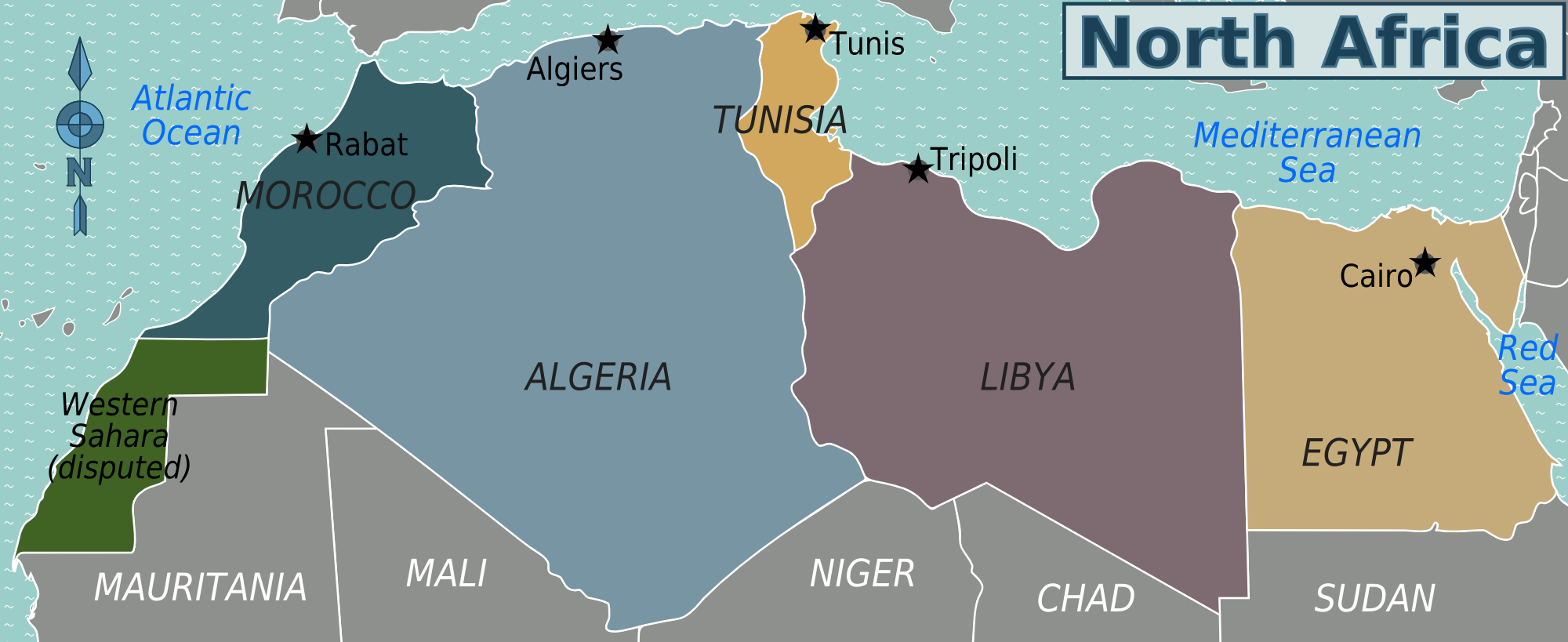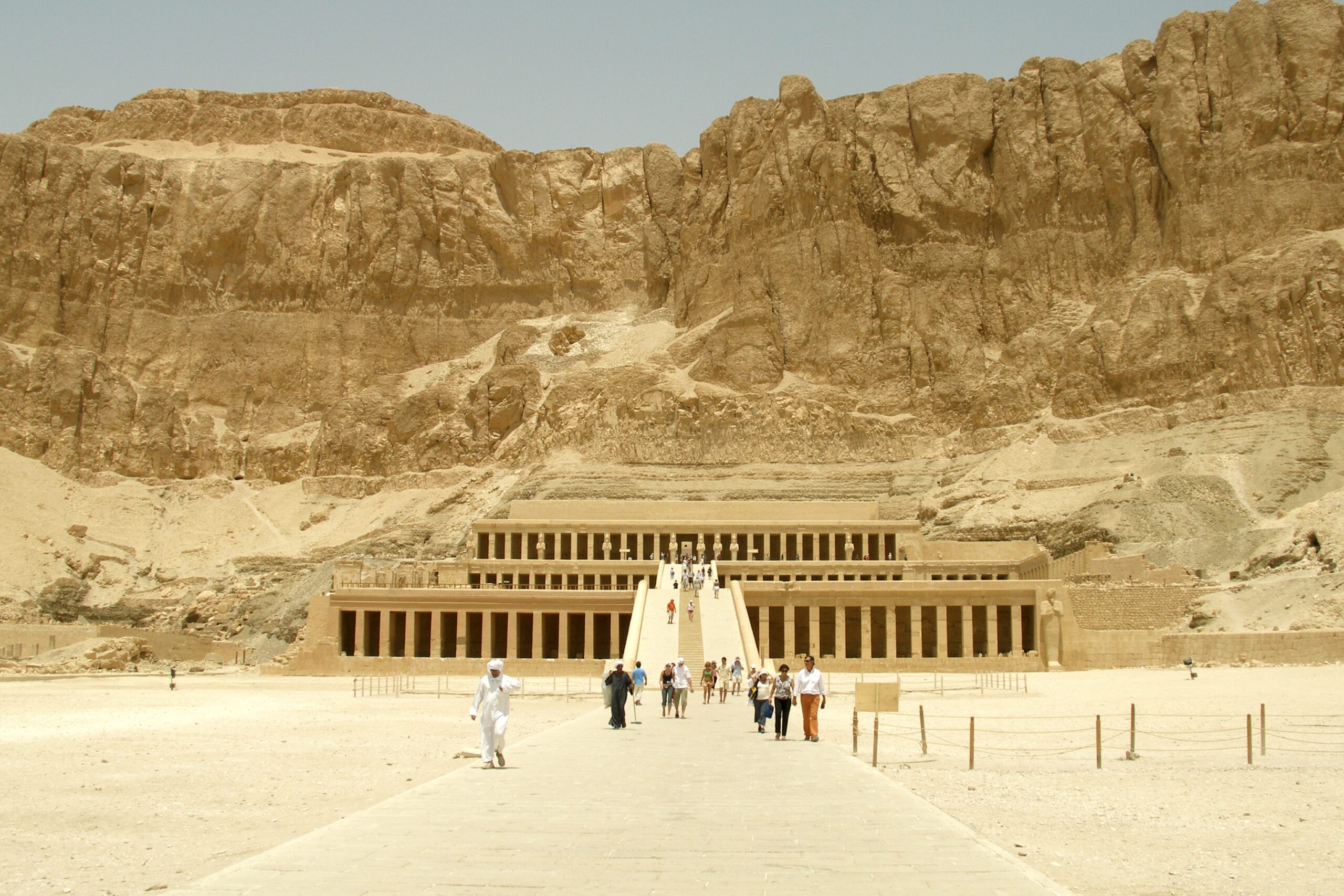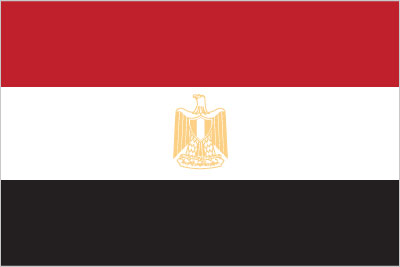
+102 Million
Population
7
UNESCO Sites
+1,001,450
Square Kilometers
Get Ready to Started?
Egypt
Country Overview
Egypt, officially known as the Arab Republic of Egypt, is a country located in the northeastern corner of Africa and the southwestern corner of Asia. It is the 30th most populous country in the world with a population of over 102 million people. Egypt is known for its rich history, diverse culture, and significant contributions to the world in various fields such as science, mathematics, and art.
Geographic Location
Egypt is located in the northeastern part of Africa, with the Sinai Peninsula forming a land bridge to Asia. It is bordered by the Mediterranean Sea to the north, the Gaza Strip and Israel to the northeast, the Red Sea to the east, Sudan to the south, and Libya to the west. The Nile River, the longest river in the world, runs through Egypt, providing a vital source of water and fertile land for agriculture.
Map showing Egypt’s location in Africa. By Sanjay Rao
Getting Around
Major and Minor Airports:
- Cairo International Airport (Cairo): The main international gateway, located in the capital, serving domestic and international flights.
- Borg El Arab Airport (Alexandria): Serves Alexandria and nearby regions with domestic and international routes.
- Sharm El-Sheikh International Airport (Sharm El-Sheikh): A hub for tourists visiting the Red Sea and Sinai Peninsula.
- Hurghada International Airport (Hurghada): Primarily caters to travelers heading to the Red Sea resorts.
- Luxor International Airport (Luxor): Serves visitors exploring Egypt’s ancient temples and Valley of the Kings.
Flying Times to Egypt:
Here are approximate flying times to Egypt from major global hubs:
- From Europe:
- London: Approximately 4–5 hours
- Paris: Approximately 4–5 hours
- From Asia:
- Dubai: Approximately 4–5 hours
- Tokyo: Approximately 14–15 hours (with layovers)
- From North America:
- New York: Approximately 10–11 hours (direct flights available)
- Toronto: Approximately 11–12 hours (with layovers)
- From South America:
- São Paulo: Approximately 16–18 hours (with multiple connections)
- From Africa:
- Nairobi: Approximately 5–6 hours
- Johannesburg: Approximately 7–8 hours
- From Oceania:
- Sydney: Approximately 18–20 hours (with multiple connections)
Popular Cities:
- Cairo: Home to the Pyramids, Sphinx, and vibrant markets.
- Alexandria: Known for its Mediterranean charm and ancient history.
- Luxor: Famous for temples and royal tombs.
- Aswan: A serene Nile city with cultural landmarks.
- Sharm El-Sheikh: Renowned for beaches and diving.
- Hurghada: A top destination for water sports and resorts.
Transportation: There is a well-connected transportation system that makes traveling between cities and regions easy. Domestic flights are common, especially between Cairo, Luxor, Aswan, and the Red Sea resorts. Trains run along the Nile Valley, connecting Cairo with Alexandria, Luxor, and Aswan. In cities, taxis, ride-hailing apps like Uber, and minibusses are widely available. For a more scenic route, Nile cruises are a unique way to travel between Luxor and Aswan, combining transportation with leisure.
Did You Know?
The Great Pyramid of Giza, built for Pharaoh Khufu around 2560 BC, is the only one of the Seven Wonders of the Ancient World that still exists today.
Popular Destinations
- Cairo: A lively capital packed with history, from the Pyramids of Giza to the Egyptian Museum and bustling souks like Khan el-Khalili.
- Alexandria: A coastal gem with Mediterranean vibes, historic landmarks, and the modern Bibliotheca Alexandrina.
- Luxor: Known as the “world’s greatest open-air museum,” with iconic sites like the Valley of the Kings and Karnak Temple.
- Aswan: A peaceful city along the Nile, famous for Philae Temple and the stunning Nubian culture.
- Sharm El-Sheikh: A resort town offering incredible diving, clear waters, and a gateway to Sinai’s desert adventures.
- Hurghada: A popular Red Sea destination with luxury resorts, vibrant nightlife, and snorkeling opportunities.
Social and Cultural Insights
People and Society: The population is diverse, with a mix of ethnicities, religions, and cultures. The majority of the population is Arab, with significant minority groups including Nubians, Berbers, and Bedouins. The official language is Arabic, with English and French used in tourism and business. The majority of the population is Muslim, with a significant Christian minority.
Egypt’s society is largely patriarchal, with men holding positions of power and authority. Women’s rights have improved in recent years, but there is still a significant gender gap in many areas, including education and employment.
Culture: The culture is a mix of traditions, music, art, cuisine, and festivals.
- Egyptian music is diverse, with influences from Arabic, African, and Western cultures.
- Egypt is also home to numerous festivals and events, including the Cairo International Film Festival, the Arab Music Festival, and the Abu Simbel Sun Festival.
- Art is an important part of Egyptian culture, with notable examples including ancient Egyptian art, Islamic calligraphy, and modern art.
- Egyptian cuisine is known for its use of spices, herbs, and grains, with popular dishes including koshary, molokhia, and falafel.
Cultural Etiquette and Tips: Egyptians are known for their hospitality and warmth. A firm handshake is a standard greeting, but men and women may avoid physical contact in more conservative settings. Visitors should dress modestly, especially when exploring mosques, churches, or rural areas. Showing respect for elders and taking the time to greet others with a friendly “Salam Alaikum” (peace be upon you) goes a long way. Avoid discussing sensitive topics like politics or religion unless you know the person well. As with most countries, always ask before taking photos, particularly in traditional neighborhoods or near government buildings.
Public Holidays:
- Revolution Day: July 23rd
- Labour Day: May 1st
- National Police Day: January 25th
- Eid al-Fitr: Date varies (Celebrated at the end of Ramadan)
- Eid al-Adha: Date varies (Feast of Sacrifice)
- Christmas: January 7th (Coptic Christmas)
- Abu Simbel Sun Festival: February 22nd and October 22nd
- Cairo International Film Festival: Dates vary annually.
It’s advisable to check the latest public holiday schedule before planning your travel dates.

Temple of Hatshepsut, Egypt. By Vyacheslav Argenberg
Climate and Natural Highlights
Climate: Egypt’s climate is a mix of desert heat and Mediterranean mildness. Coastal areas like Alexandria and the northern coast enjoy warm, breezy summers and mild winters. In contrast, cities along the Nile and the desert regions, including Luxor and Aswan, experience scorching summers with temperatures that can soar above 40°C, while winters are much cooler.
The best time to visit depends on your plans. Winter (October to March) is perfect for exploring ancient monuments in Luxor or cruising the Nile. Spring and fall are ideal for Red Sea beaches or wandering through Cairo’s bustling streets.
Sunrise and Sunset Times: Thanks to its location, Egypt enjoys long sunny days for most of the year. In summer, the sun typically rises around 5:00 AM and sets by 6:30 PM, while in winter, sunrise is closer to 6:30 AM and sunset by 5:00 PM. This makes early mornings and evenings the best times for outdoor activities.
Wildlife and Natural Landscapes: The landscapes are as diverse as they are stunning. The Nile River brings life to the valleys, creating fertile areas filled with palm trees and vibrant greenery. The Red Sea is known for its rich marine life and coral reefs, making it a popular spot for diving and snorkeling. In the deserts, you’ll find animals like camels and desert foxes, while wetlands attract various migratory birds during certain seasons.
Economic and Political Overview
History: It’s history dates back to the 4th millennium BCE, with the unification of Upper and Lower Egypt under the rule of King Narmer. The ancient Egyptian civilization flourished for over 3,000 years, leaving behind a rich legacy of art, architecture, and culture. It was later conquered by various foreign powers, including the Persians, Greeks, Romans, and Arabs. On 28th February 1922, Egypt gained independence from British rule and became a republic in 1953.
Government and Politics: Egypt is a republic with a presidential system of government. The president is the head of state and is elected by popular vote for a four-year term, with a maximum of two terms. The prime minister is the head of government and is appointed by the president. The legislative branch is bicameral, consisting of the House of Representatives and the Shura Council. Their political system has undergone significant changes since the 2011 revolution, with a new constitution being adopted in 2014 and amendments being made in 2019.
Economy: Egypt’s economy is the second-largest in the Arab world, with a GDP of over $300 billion. The country’s economy is diverse, with key sectors including agriculture, industry, and services. Egypt is known for its production of cotton, rice, and sugar, as well as its manufacturing sector, which includes textiles, food processing, and chemicals. The tourism industry is also a significant contributor to the economy, with popular destinations including the Pyramids of Giza, the Nile River, and the Red Sea resorts.
Safety, Health, and Entry Requirements
- Safety and Travel Advisories: Egypt is generally safe for tourists. The U.S. Department of State advises travelers to exercise caution in certain areas, including the Sinai Peninsula and the Western Desert. It is recommended to check the latest travel advisories and safety information before traveling to Egypt.
- Healthcare and Vaccinations: There is a well-developed healthcare system, with both public and private hospitals and clinics available. Travelers should ensure they have adequate health insurance coverage and are up-to-date on vaccinations before traveling. Visitors arriving from most countries in Africa, South and North America will need a vaccination certificate against yellow fever. It is also recommended to consult with a healthcare provider for the latest vaccination recommendations and travel health advice.
- Visa Requirements and Entry Procedures: Most travelers require a visa to enter the country. Visas can be obtained at Egyptian embassies and consulates, as well as at airports and border crossings. It is recommended to check the latest visa requirements and entry procedures before traveling to Egypt. More information can be found on the Egyptian embassy or consulate website in your country of residence.

Region
Capital City
- Cairo
Currency
- Egyptian Pound (EGP)
Languages
- Arabic
- English
- French
- Nubian
Timezone
- Eastern European Time (EET) , UTC +2
- United States

